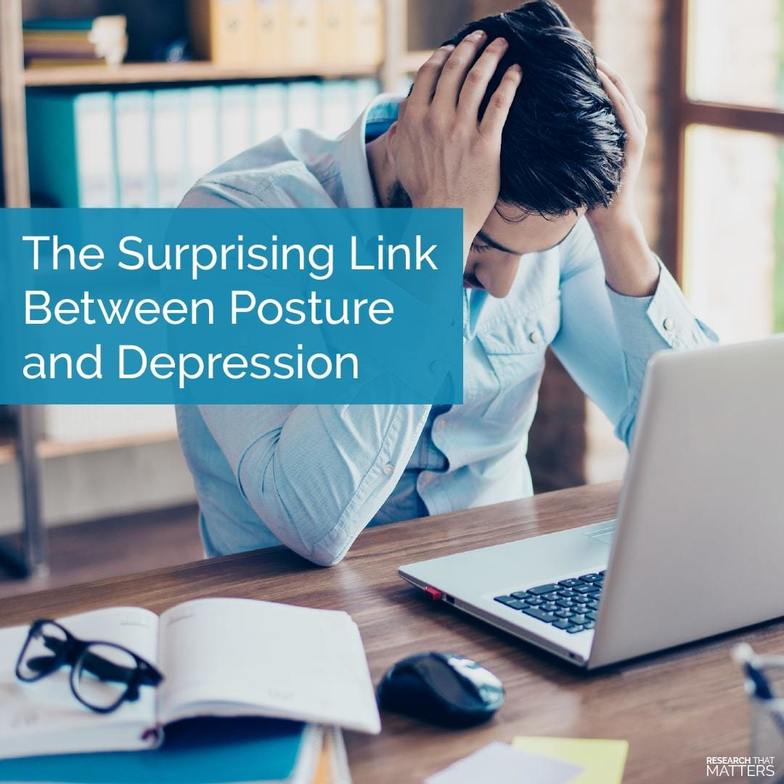
Bottom Line:
Posture can either work for or against us.
Take it from the leading posture correction specialist in Austin.
Each day we’re learning more and more about new health conditions associated with prolonged sitting, ill-positioned technology, and even furniture that may have been repurposed to suit the frantic requirements levied at the start of the pandemic.
It’s obvious that it’s never been more important to find the best posture for working at our computers.
And get this.
We’re also learning more about how emotions, posture, and pain sensitivity may all be influenced by each other to some degree.
In fact, posture and depression may be connected.
Consider this.
Have you ever been able to tell someone's mood just by how they walked into a room?
We all have!
It's a great example of how our posture and attitude are connected.
Within seconds you can look at someone and tell whether they are confident or happy.
Posture can influence mood and vice versa for a number of reasons.
Let’s take a closer look at posture and depression.
Why it Matters:
Certain postures have been linked to depression and other health challenges.
For the upper body, we usually see the muscles in the chest and the back of the neck become tight, and the muscles in the front of the neck and the upper back become weak.
This creates the forward head position and rounded shoulders we associate with poor posture.
When you slouch in your chair or stand with poor posture, you put extra strain on your joints and force your supporting muscles to work harder.
To help you better understand just how posture and depression can be linked, try this.
Slouch your shoulders, tilt your head forward, look down at your lap, and then try to take a deep breath.
Note how you feel.
Now, reverse that posture, sit up tall, pull your shoulders back, and take another deep breath in.
Quite the difference, right?
It’s easy to see how maintaining an unnatural, stooped posture can create aches and pains.
And if you’re living with daily aches and pains, contacting a posture correction specialist in Austin to evaluate your posture can be a great place to start.
Researchers studying posture and depression found that people who were depressed experienced an improved mood after they changed their posture to be more upright.
That's right.
By maintaining a healthy posture, you can gain a better mindset as well as a stronger core and a healthier overall lifestyle.
The exact reason posture, emotion, and pain sensitivity appear to be connected has yet to be determined.
Some believe it’s as simple as feeling emotionally better yourself when your body is in certain positions.
Another theory is that our body posture and position can influence the release of endorphins or feel-good chemicals in the brain.
Whatever the explanation, when it comes to posture and depression, developing good posture habits can help you feel more confident, energetic, and happy.
To recap...
● Slumped posture has been linked with depressive symptoms
● An upright posture has been shown to improve your mood immediately
● Emotions and thoughts affect your posture and energy level.
Look up and pull your shoulders back to reset your mind and body!
Next Steps:
The next time you feel down, consider what you now know about posture and depression and pay attention to your posture.
You’ll more than likely find yourself slumped with your head and neck curved forward and down.
One of the best changes you can make in that moment is to pull your shoulder blades back and together, relax your shoulders down away from your ears, and look up.
The more you work on it, the easier it will become.
Start by holding your head and chest in this corrected position for a minute at a time to help build endurance.
You’d be surprised how much of a difference a few minutes a day can make!
And if your posture is causing you neck or back pain, reaching out to a posture correction specialist in Austin to evaluate your alignment and more is the place to start.
Our doors are open, and we’re here to help.
If you're experiencing depression, we recommend reaching out to a professional for help.
Science Source:
Upright Posture Improves Affect and Fatigue. J Behav Ther Exp Psychiatry. 2017.






